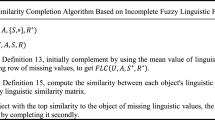Abstract
The subject of this work is to establish a mathematical framework that provide the basis and tool for uncertainty reasoning based on linguistic information. This paper focuses on a flexible and realistic approach, i.e., the use of linguistic terms, specially, the symbolic approach acts by direct computation on linguistic terms. An algebra model with linguistic terms, which is based on a logical algebraic structure, i.e., lattice implication algebra, is applied to represent imprecise information and deals with both comparable and incomparable linguistic terms (i.e., non-ordered linguistic terms). Within this framework, some inferential rules are analyzed and extended to deal with these kinds of lattice-valued linguistic information.
Preview
Unable to display preview. Download preview PDF.
Similar content being viewed by others
References
Birkhoff, G.: Lattice Theory, 3rd edn. American Mathematical Society, New York (1967)
Goguen, J.A.: The logic of inexact concepts. Synthese 19, 325–373 (1968)
Ho, N.C., Wechler, W.: Hedge algebras: an algebraic approach to structure of sets of linguistic truth values. Fuzzy Sets and Systems 35, 281–293 (1990)
Ho, N.C., Wechler, W.: Extended hedge algebras and their application to fuzzy logic. Fuzzy Sets and Systems 52, 259–281 (1992)
Lee, T.T., Xu, Y.: “The consistencey of rule-bases in lattice-valued first-order logic LF(X),”. In: Proc. of 2003 IEEE Internatinal Conference on SMC, pp. 4968–4973 (2003)
Novak, V.: First-order fuzzy logic. Studia Logica 46, 87–109 (1982)
Pavelka, J.: On fuzzy logic I: Many-valued rules of inference, II: Enriched residuated lattices and semantics of propositional calculi, III: Semantical completeness of some many-valued propositional calculi. Zeitschr. F. Math. Logik und Grundlagend. Math. 25, 119-134, 447-464 (1979)
Pei, Z., Xu, Y.: Lattice implication algebra model of a kind of linguistic terms and its inference. In: Proc. of the 6th International FLINS Conference, pp. 93–98 (2004)
Turksen, I.B., Kandel, A., Zhang, Y.Q.: Universal truth tables and normal forms. IEEE Trans. Fuzzy Syst. 6, 295–303 (1998)
Turksen, I.B.: Computing with descriptive and verisic words. In: Proc. NAFIP 1999, pp. 13–17 (1999)
Xu, Y.: Lattice implication algebras. J. Southwest Jiaotong Univ. 89, 20–27 (1993)
Xu, Y., Qin, K.Y., Liu, J., Song, Z.M.: L-valued propositional logic LVP. Inform. Sci. 114, 205–235 (1999)
Xu, Y., Ruan, D., Liu, J.: Approximate reasoning based on lattice-valued propositional logic L vpl . In: Ruan, D., Kerre, E.E. (eds.) Fuzzy Sets Theory and Applications, pp. 81–105. Kluwer Academic Publishers, Dordrecht (2000)
Xu, Y., Liu, J., Song, Z.M., Qin, K.Y.: On sematics of L-valued first-order logic LVF. Int. J. Gen. Syst. 29, 53–79 (2000)
Xu, Y., Song, Z.M., Qin, K.Y., Liu, J.: Syntax of L-valued first-order logic LVF. Int. J. Mutiple-Valued Logic 7, 213–257 (2001)
Xu, Y., Ruan, D., Qin, K.Y., Liu, J.: Lattice-Valued Logic. Springer, Berlin (2003)
Zadeh, L.A.: Fuzzy logic = computing with words. IEEE Trans. Fuzzy Syst. 4, 103–111 (1996)
Author information
Authors and Affiliations
Editor information
Editors and Affiliations
Rights and permissions
Copyright information
© 2005 Springer-Verlag Berlin Heidelberg
About this paper
Cite this paper
Chen, S., Xu, Y., Ma, J. (2005). A Linguistic Truth-Valued Uncertainty Reasoning Model Based on Lattice-Valued Logic. In: Wang, L., Jin, Y. (eds) Fuzzy Systems and Knowledge Discovery. FSKD 2005. Lecture Notes in Computer Science(), vol 3613. Springer, Berlin, Heidelberg. https://doi.org/10.1007/11539506_35
Download citation
DOI: https://doi.org/10.1007/11539506_35
Publisher Name: Springer, Berlin, Heidelberg
Print ISBN: 978-3-540-28312-6
Online ISBN: 978-3-540-31830-9
eBook Packages: Computer ScienceComputer Science (R0)




